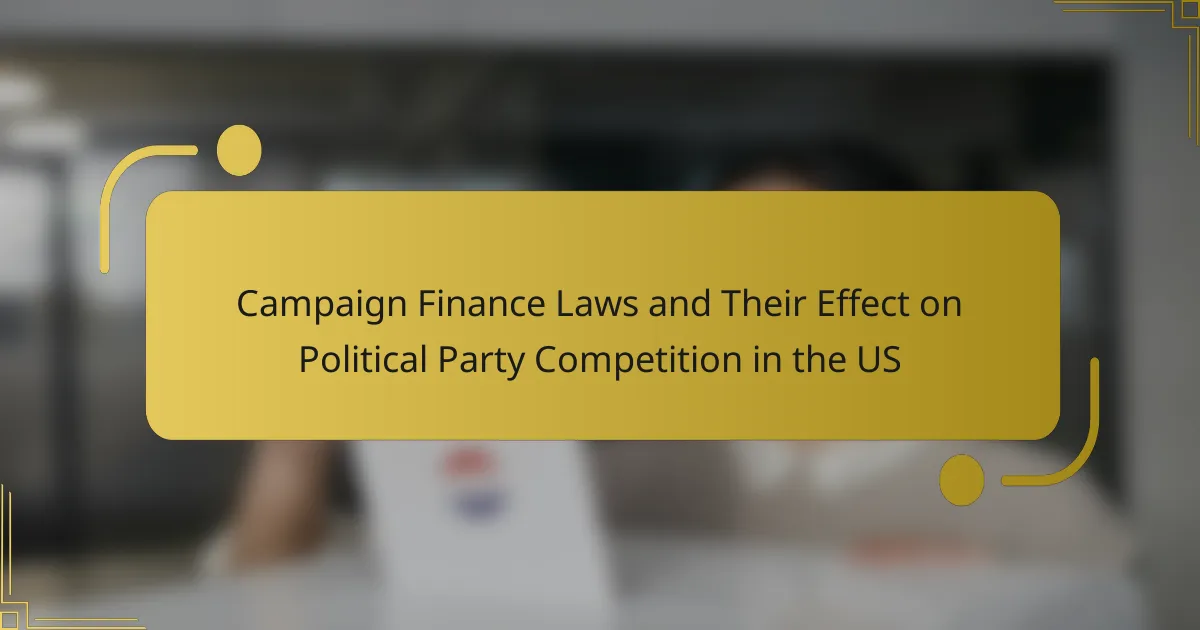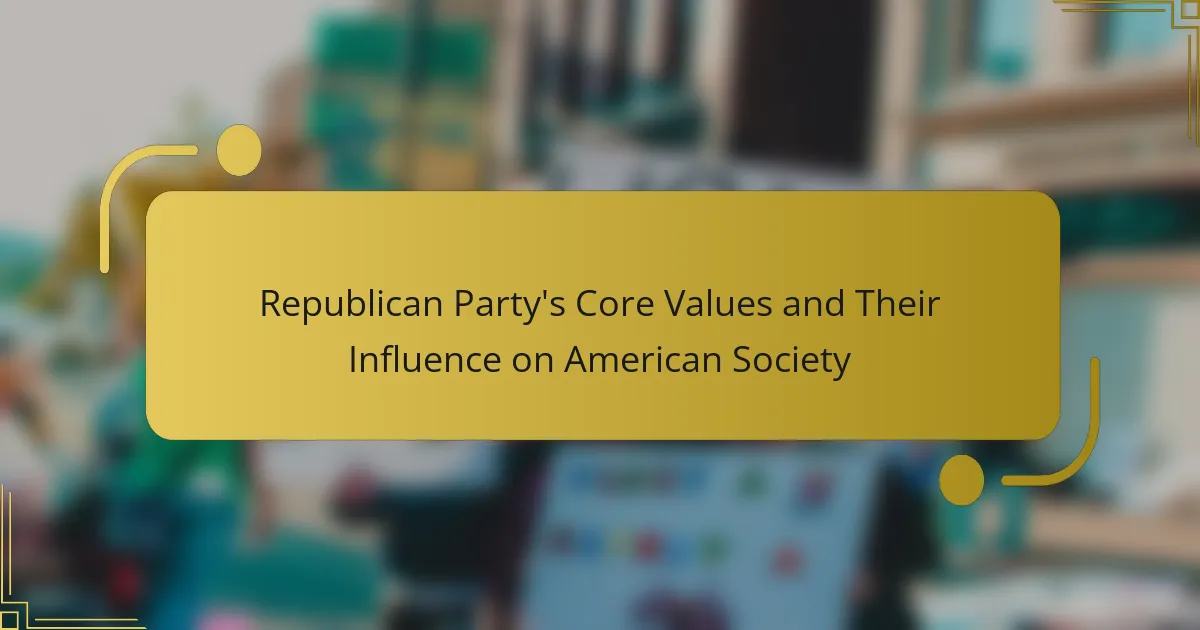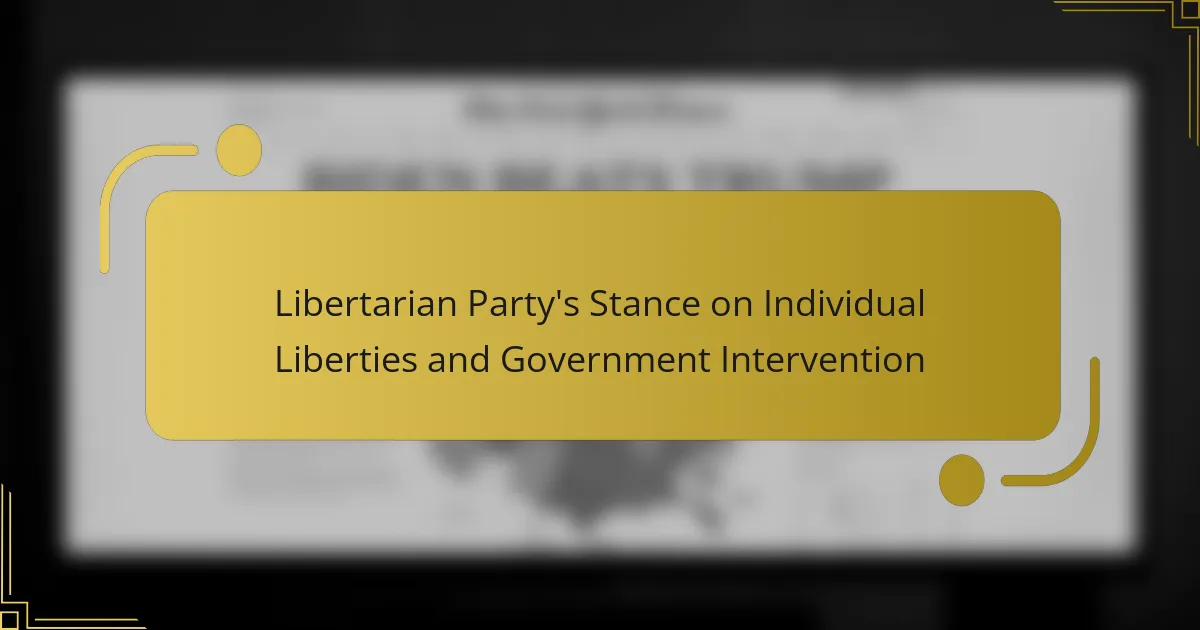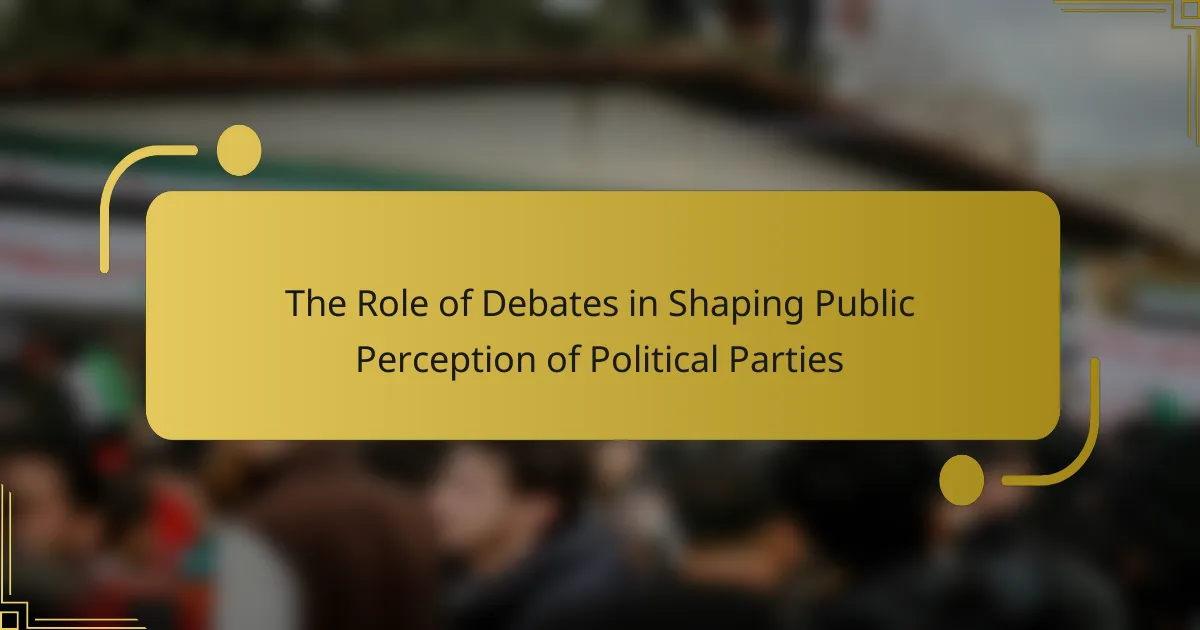Campaign finance laws are regulations that govern the raising and spending of money in political campaigns, aiming to ensure transparency and fairness in the electoral process. These laws dictate contribution limits for individuals and organizations and establish expenditure caps for campaigns, varying by state and influenced by federal regulations overseen by the Federal Election Commission (FEC). The impact of these laws on political party competition is significant, as stricter regulations can hinder fundraising efforts, while relaxed laws may favor well-funded parties. Challenges to campaign finance laws include concerns about free speech, transparency issues related to dark money, and the influence of wealthy donors, alongside inconsistent enforcement by regulatory agencies. This article examines the complexities and implications of campaign finance laws on the competitive landscape of political parties in the United States.
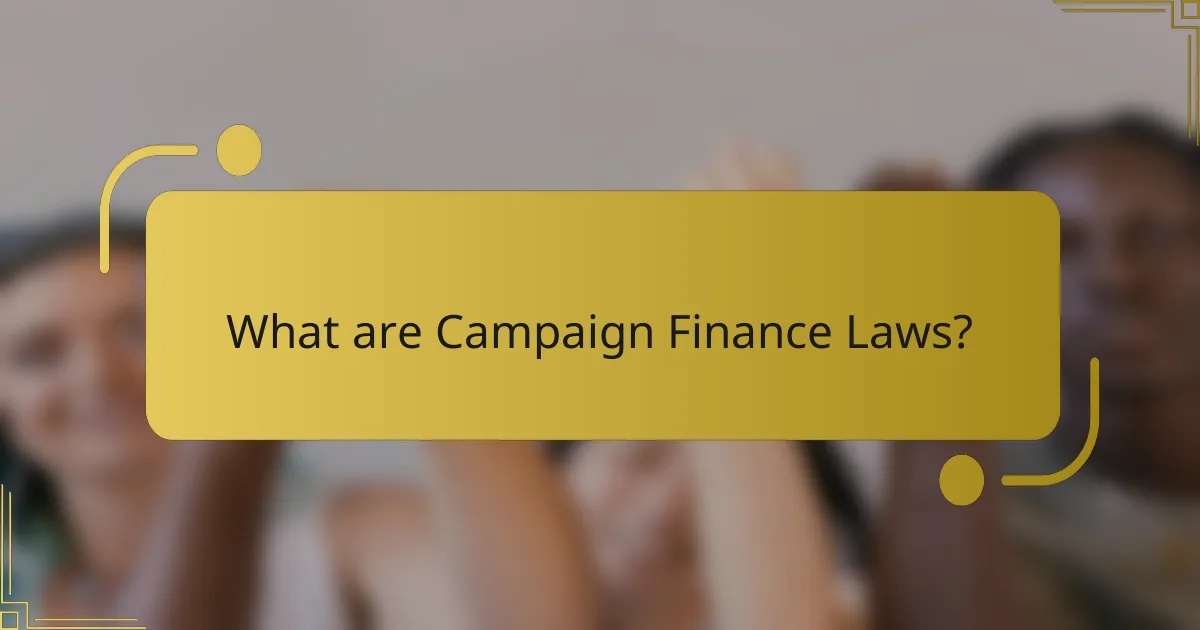
What are Campaign Finance Laws?
Campaign finance laws are regulations governing the raising and spending of money in political campaigns. These laws aim to ensure transparency and fairness in the electoral process. They dictate how much money individuals and organizations can contribute to candidates. They also set limits on campaign expenditures. Campaign finance laws vary by state and are influenced by federal regulations. The Federal Election Commission (FEC) oversees federal campaign finance laws in the United States. Violations of these laws can result in penalties, including fines. Historical cases, such as Buckley v. Valeo in 1976, have shaped the legal landscape of campaign finance.
How do Campaign Finance Laws influence political activities?
Campaign finance laws significantly influence political activities by regulating the amount and sources of money that can be spent on campaigns. These laws aim to promote transparency and reduce corruption in the political process. For example, the Bipartisan Campaign Reform Act of 2002 limited the use of soft money in federal elections. This act was designed to curb the influence of large donations from corporations and unions. Additionally, campaign finance laws require candidates to disclose their financial contributions and expenditures. This transparency allows voters to make informed decisions about candidates. Studies have shown that stricter campaign finance regulations can lead to more competitive elections by leveling the playing field among candidates. Thus, campaign finance laws play a crucial role in shaping the dynamics of political competition in the U.S.
What are the key components of Campaign Finance Laws?
Campaign finance laws primarily regulate the funding of political campaigns. These laws include limits on contributions from individuals and organizations. They also mandate transparency through disclosure requirements for campaign financing. Public financing options are available in some jurisdictions to support candidates. Additionally, laws may restrict the use of certain types of funding, such as foreign contributions. Enforcement mechanisms are established to ensure compliance with these laws. The Federal Election Commission oversees federal campaign finance regulations in the United States. These components collectively aim to promote fair competition and reduce corruption in the political process.
How do these components impact fundraising efforts?
Campaign finance laws significantly impact fundraising efforts by regulating the amount of money individuals and organizations can contribute to political campaigns. These laws create a framework that can either facilitate or restrict fundraising activities. For instance, limits on contributions can lead to increased competition among candidates as they seek to attract small donors. Conversely, allowing unlimited contributions from certain entities can lead to a concentration of financial power, favoring well-funded candidates. Research indicates that states with stricter campaign finance laws tend to have more competitive elections. A study by the Brennan Center for Justice found that increased transparency in contributions leads to higher voter engagement and participation. Thus, the components of campaign finance laws directly shape the dynamics of fundraising and influence the overall competitiveness of political parties.
Why are Campaign Finance Laws important for democracy?
Campaign finance laws are crucial for democracy because they regulate the influence of money in politics. These laws aim to ensure fair competition among candidates. They help prevent corruption and the undue influence of wealthy donors. By establishing limits on contributions, these laws promote transparency in political funding. Transparency allows voters to make informed decisions. Studies show that countries with strict campaign finance laws have higher levels of political participation. For example, the Bipartisan Campaign Reform Act of 2002 aimed to reduce the impact of soft money in elections. This act reflects an effort to enhance democratic integrity by limiting financial disparities among candidates.
What role do these laws play in ensuring fair elections?
Campaign finance laws play a crucial role in ensuring fair elections by regulating the flow of money in political campaigns. These laws aim to limit the influence of wealthy donors and special interest groups. By imposing contribution limits, they promote a level playing field among candidates. Transparency requirements help voters understand who is funding campaigns. This transparency reduces the potential for corruption and undue influence. Studies, such as those from the Brennan Center for Justice, show that stricter campaign finance laws correlate with increased voter trust in the electoral process. Overall, these laws are essential for maintaining the integrity of democratic elections.
How do they affect voter perception and trust in the political system?
Campaign finance laws significantly impact voter perception and trust in the political system. These laws shape how candidates raise and spend money during elections. When voters perceive that funding sources are opaque or heavily influenced by special interests, trust in the political system diminishes. Research indicates that transparency in campaign financing can enhance voter confidence. A study by the Brennan Center for Justice found that voters are more likely to trust candidates who disclose their donors. Conversely, when campaign finance laws allow for large, undisclosed contributions, voters may feel disenfranchised. This perception can lead to apathy and decreased voter turnout. Ultimately, the effectiveness of campaign finance laws is crucial for maintaining a healthy democratic process.
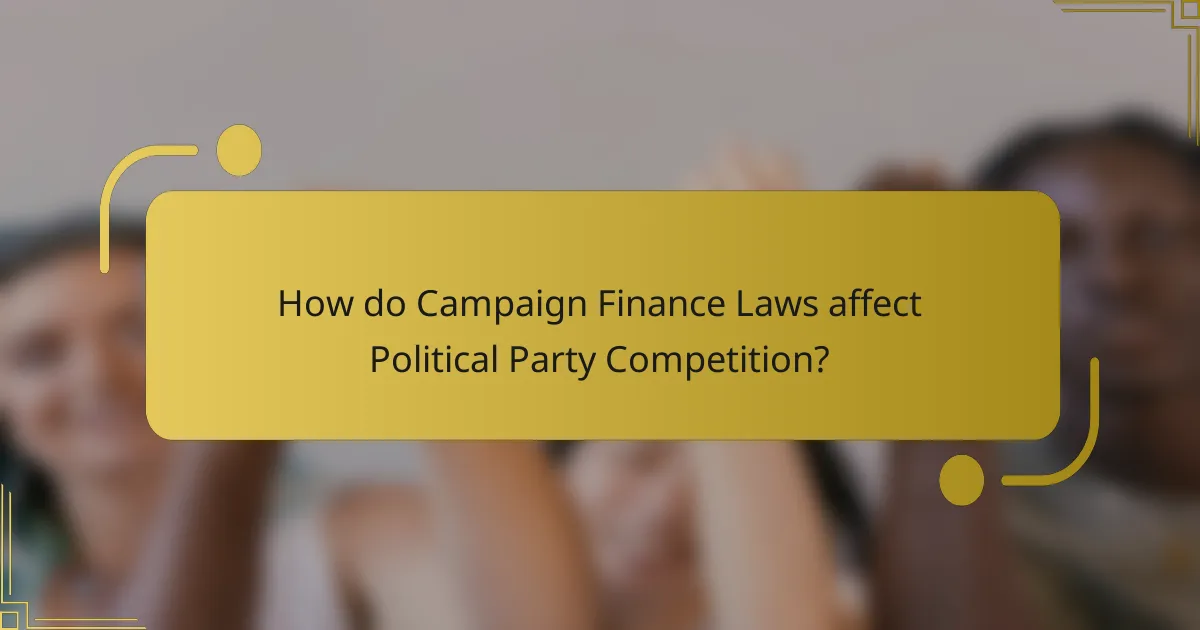
How do Campaign Finance Laws affect Political Party Competition?
Campaign finance laws significantly influence political party competition. These laws regulate the amount of money individuals and organizations can contribute to political parties and candidates. Stricter laws can limit fundraising capabilities for parties, impacting their ability to compete effectively. For example, the Bipartisan Campaign Reform Act of 2002 restricted soft money contributions, leading to reduced funding for parties. Conversely, relaxed laws, such as those following the Citizens United v. FEC decision in 2010, allowed for increased spending by outside groups. This shift can create an uneven playing field, favoring well-funded parties. Studies show that parties with greater financial resources have a higher likelihood of winning elections. Thus, campaign finance laws directly shape the competitive landscape of political parties in the U.S.
What is the relationship between funding and political party success?
Funding significantly influences political party success. Increased financial resources enable parties to enhance their campaign strategies. This includes hiring skilled staff, purchasing advertising, and organizing outreach efforts. Historical data shows that well-funded candidates often secure higher voter turnout. For instance, a study by the Center for Responsive Politics found that candidates who raised more money had a 90% chance of winning their elections. Additionally, funding allows parties to engage in more extensive voter engagement initiatives. This leads to greater visibility and public awareness of their platforms. Overall, the correlation between funding and electoral success is well-documented in political science research.
How do varying funding levels impact party strategies?
Varying funding levels significantly impact party strategies. Higher funding allows parties to invest in extensive outreach efforts. This includes advertising, grassroots mobilization, and data analytics. For instance, parties with robust funding can afford targeted advertisements in key demographics. Conversely, lower funding restricts these capabilities, forcing parties to rely on volunteer efforts and organic outreach. Research shows that candidates who outspend their opponents often win elections. A study by the Center for Responsive Politics highlights that candidates who raised over $1 million had a 90% chance of winning their races. Thus, funding shapes the strategic choices parties make in campaigning and resource allocation.
What evidence exists to support this relationship?
Research indicates that campaign finance laws significantly influence political party competition in the US. Studies show that stricter campaign finance regulations lead to a more level playing field among parties. For example, a 2016 study by the National Bureau of Economic Research found that increased limits on contributions reduced the dominance of wealthy donors. Additionally, the Brennan Center for Justice reported that states with robust campaign finance laws experience higher voter turnout and more competitive elections. These findings suggest that effective campaign finance laws can enhance democratic engagement and party competition.
How do Campaign Finance Laws create advantages for certain parties?
Campaign finance laws create advantages for certain parties by regulating the flow of money in politics. These laws often favor established parties with greater fundraising capabilities. For example, larger parties can access more resources for campaigning. They can leverage their networks to gather donations more effectively.
Additionally, incumbents benefit from these laws due to their established donor bases. Research shows that incumbents often raise significantly more than challengers. According to the Federal Election Commission, incumbents raised over $1 billion in the 2020 election cycle.
Furthermore, restrictions on donations can limit the influence of smaller parties. This creates a barrier to entry for new candidates. Consequently, the political landscape often remains dominated by a few key players. Thus, campaign finance laws reinforce existing power structures.
What mechanisms allow for disparities in funding among parties?
Disparities in funding among political parties arise from various mechanisms. These include differing access to donor networks, variations in fundraising capabilities, and the influence of super PACs. Wealthier parties often attract more significant donations due to established relationships with affluent donors. Smaller parties may struggle to reach potential contributors, limiting their financial resources. Campaign finance laws also impact funding; for instance, limits on individual contributions can disadvantage parties with less name recognition. Additionally, the allocation of public funding can favor larger parties, further widening the gap. Research shows that these factors create an uneven playing field in political competition.
How do these advantages influence electoral outcomes?
Advantages in campaign finance laws influence electoral outcomes by enabling candidates to raise more funds. Increased funding allows for more extensive advertising campaigns. This leads to greater visibility among voters. Candidates with more resources can also hire skilled staff and conduct detailed voter outreach. Studies show that well-funded candidates often outperform their opponents in elections. For example, in the 2020 U.S. elections, candidates who spent more than their opponents won approximately 80% of the time. Thus, financial advantages significantly impact the competitiveness and success of political campaigns.
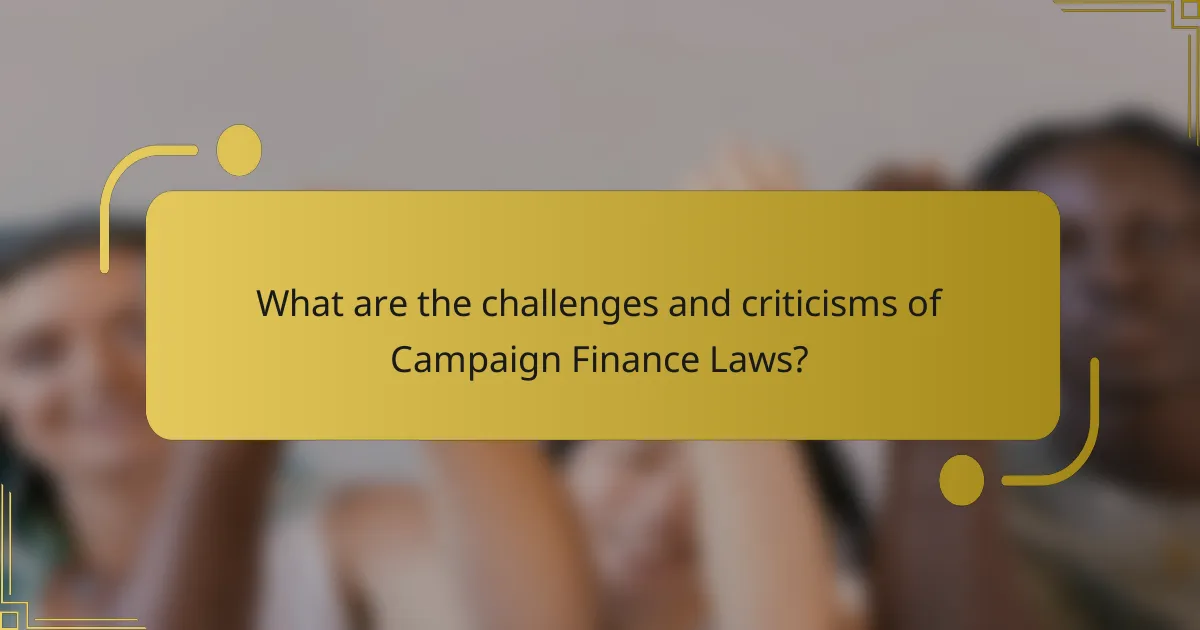
What are the challenges and criticisms of Campaign Finance Laws?
Campaign finance laws face several challenges and criticisms. One major challenge is the perception that these laws limit free speech. Critics argue that spending money on political campaigns is a form of protected speech under the First Amendment. This viewpoint gained traction following the Supreme Court’s decision in Citizens United v. FEC (2010), which allowed unlimited independent expenditures by corporations and unions.
Another challenge is the issue of transparency. Many campaign finance laws require disclosure of donations, but loopholes exist. For instance, dark money groups can spend without revealing their donors, leading to a lack of accountability. This obscurity can undermine public trust in the political process.
Additionally, critics highlight the disproportionate influence of wealthy donors. Campaign finance laws often favor individuals and organizations with substantial financial resources. This can lead to an uneven playing field, where candidates without access to large donations struggle to compete effectively.
Finally, enforcement of campaign finance laws can be inconsistent. Regulatory agencies like the Federal Election Commission (FEC) often face budget constraints and political pressures. This can result in inadequate oversight and enforcement of existing laws, allowing violations to go unchecked. These criticisms illustrate the complexities and ongoing debates surrounding campaign finance regulations in the United States.
What common criticisms are leveled against these laws?
Common criticisms of campaign finance laws include claims of limiting free speech. Critics argue that restrictions on contributions hinder political expression. Some assert that these laws disproportionately benefit established parties. They believe larger parties can navigate regulations more effectively. Others point to loopholes that allow wealthy individuals to circumvent limits. This creates an uneven playing field in elections. Additionally, some argue that transparency requirements can deter potential donors. They fear public scrutiny may discourage contributions. Overall, these criticisms reflect concerns about fairness and the democratic process.
How do critics argue that these laws affect political equality?
Critics argue that campaign finance laws undermine political equality by favoring wealthy individuals and corporations. These laws often allow significant financial contributions that can disproportionately influence elections. As a result, candidates who rely on large donations may prioritize the interests of their donors over those of average voters. This creates a system where political power is concentrated among the affluent. Studies indicate that higher campaign spending correlates with greater electoral success. Furthermore, critics highlight that this dynamic can discourage grassroots participation and diminish the voices of less wealthy constituents. The overall effect is a political landscape where economic disparities translate into unequal political influence.
What are the implications of these criticisms for future reforms?
The implications of these criticisms for future reforms include a potential reevaluation of campaign finance regulations. Critics argue that current laws favor wealthy donors and limit equal competition among political parties. This may lead to calls for stricter limits on contributions and increased transparency in funding sources. Additionally, reforms could focus on public financing options to level the playing field. Historical instances, such as the Bipartisan Campaign Reform Act of 2002, illustrate attempts to address these issues. Future reforms may also consider the impact of digital fundraising and social media on campaign finance dynamics. Overall, these criticisms could drive a push for more equitable and transparent electoral processes.
How can Campaign Finance Laws be improved?
Campaign finance laws can be improved by increasing transparency in political donations. This can be achieved by requiring all organizations to disclose their donors. Enhanced reporting requirements would ensure that contributions are publicly accessible. Additionally, limiting the amount individuals and entities can donate would reduce the influence of money in politics. Implementing stricter regulations on Super PACs could also mitigate their impact on elections. Furthermore, public financing options for campaigns could level the playing field for candidates. Studies indicate that transparency leads to greater public trust in the electoral process. For example, the Center for Responsive Politics reports that transparency initiatives increased accountability among candidates and organizations.
What best practices can be adopted to enhance transparency?
Adopting best practices to enhance transparency in campaign finance involves several key actions. First, implementing clear reporting requirements for all campaign contributions is essential. This can include specifying the source and amount of each contribution. Second, establishing a public database for campaign finance records promotes accessibility. Voters can then easily track funding sources and spending patterns. Third, mandating regular audits of campaign finances ensures compliance and accountability. Research shows that states with stringent transparency laws report higher voter trust. According to the Brennan Center for Justice, transparency in campaign finance leads to increased public confidence in electoral processes. These practices collectively foster a more open political environment.
How can reforms address the balance of power among political parties?
Reforms can address the balance of power among political parties by implementing campaign finance laws. These laws can limit the amount of money individuals and organizations can contribute to parties. This creates a more level playing field for smaller parties. It reduces the influence of wealthy donors on political outcomes. Additionally, reforms can enhance transparency in campaign financing. By requiring full disclosure of funding sources, voters can make informed choices. Evidence from the Bipartisan Campaign Reform Act of 2002 shows that limiting soft money contributions helped reduce the dominance of major parties. Overall, targeted reforms can promote fairer competition among political parties.
What best practices should political parties follow regarding campaign finance?
Political parties should adhere to transparency, accountability, and compliance in campaign finance. Transparency involves disclosing all sources of funding and expenditures. This builds trust with voters and stakeholders. Accountability requires parties to maintain accurate financial records and report them regularly. Compliance with federal and state laws is crucial to avoid legal penalties.
Additionally, political parties should implement internal controls to prevent mismanagement of funds. Establishing clear guidelines for fundraising activities is essential. Engaging in ethical fundraising practices enhances credibility. Parties should also educate members about campaign finance laws. This ensures everyone understands their responsibilities.
Research indicates that transparency in campaign financing correlates with higher voter engagement (Source: “Campaign Finance and Political Participation,” Journal of Politics, Authors: Smith et al., 2021). Following these best practices can lead to more competitive and fair elections.
Campaign finance laws are regulations that govern the raising and spending of money in political campaigns, aiming to ensure transparency and fairness in the electoral process. This article examines how these laws influence political activities, fundraising efforts, and party competition in the U.S., highlighting key components such as contribution limits and transparency requirements. It also addresses the challenges and criticisms of campaign finance laws, including concerns about free speech and the disproportionate influence of wealthy donors. Ultimately, the article explores potential reforms to enhance transparency and promote equitable competition among political parties.
